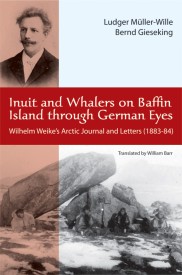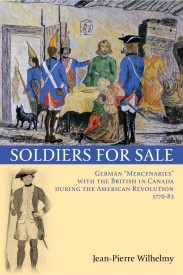
286 pp Trade paper 29.95 97819268241
INUIT AND WHALERS ON BAFFIN ISLAND THROUGH GERMAN EYES
Wilhelm Weike’s Arctic Journal and Letters (1883-84)
by Ludger Müller-Wille & Bernd Gieseking (Translated by William Barr)
Wilhelm Weike, a 23-year old ordinary handyman from Minden/Germany, accidentally found himself spending the year of 1883-84 among Inuit and wintering with whalers on Baffin Island in the Canadian Arctic. He was hired as servant to the fledgling scientist Franz Boas (1858-1942), later the eminent cultural anthropologist. During this sojourn Weike attended to and assisted Boas in his geographical and ethnological research following the first Polar Year of 1882-83. He kept a journal, a fascinating text and the longest he would ever write in his life, an exceptional piece of working-class literature.
This common man with basic education wrote a unique account of meeting and interacting with Inuit in a remote world totally alien to him. He keenly observes the life and habits of the Inuit, accepting them as equals and exhibiting no cultural arrogance. His journal provides an unusual historical glimpse of the human condition in the Arctic in the late nineteenth century. It complements the journals that Boas wrote simultaneously. Müller-Wille and Gieseking edited and annotated Weike’s journal extensively and, in addition, present his biography and highlight his observations and contributions next to Boas’ scientific work.
In bookstores November 1
Ludger Müller-Wille (anthropologist/geographer, McGill University) has studied human conditions in the circumpolar North—in Finland with Sámi and Finns, in Canada with Inuit, Dene, and Naskapi. His previous book is Franz Boas among the Inuit of Baffin Island 1883-1884 (1998).
Bernd Gieseking is a writer, playwright, and stage and radio comedian who, Like Weike and Boas, is from Minden, Germany. His dramatization of Weike’s and Boas’ arctic sojourn, The Colour of Water, premiered in 2010.
William Barr is a senior research associate with the Arctic Institute of North America, University of Calgary. He has translated many books from French, German, and Russian on Arctic and Antarctic explorers and scientists, including the arctic journals of Franz Boas.
—————————–

278 pp $27.95 9781926824123
SOLDIERS FOR SALE
German “Mercenaries” with the British in Canada during the American Revolution (1776-83)
By Jean-Pierre Wilhelmy
The British Army that fought the American Revolutionaries was in fact an Anglo-German army. The British Crown had doubts about the willingness of English soldiers to fight against other English-speaking people in North America. It also doubted the loyalty of the Canadiens who had only just been taken over after the conquest of New France. It thus turned to the princes of German States, who were also relatives of England’s ruling family, to obtain troops. To the Americans, these soldiers are known as The Hessians. In return for large amounts of money, German princes and barons provided about 30,000 soldiers, of whom some 10,000 were located in Canada for up to seven years and 2,400 chose to remain in Canada after the war. Many were dragged unwillingly from their families and sent to fight in a war in which they had no interest. Those who remained in Canada represented close to five percent of the male population at the time. They melted into the French and English-speaking societies, their names were Gallicized or Anglicized, but their history was unknown until this book appeared, even to their own descendants.
Jean-Pierre Wilhelmy is a Montreal historian who, in the late 1970s, wanted to know where his ancestors came from and discovered a major unexplored part of Canadian history. He published his work in French originally in 1980s and has constantly updated it. He has also written two books of historical fiction based on his research. This updated English adaptation of his research is his first publication in English.
In bookstores in Canada, November 15 (March 2012 in the United States)



Facebook